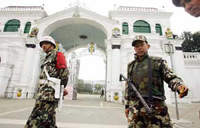Nepal bans protests in key areas
Nepal's new government banned rallies around key areas in the capital Thursday ahead of a Parliament vote to curtail King Gyanendra's powers after he ceded control to opposition politicians last month.

A notice on state-run radio said rallies and protests would not be allowed around the royal palace and the Singha Durbar, a walled complex which that contains the parliament building, prime minister's office, ministries and other key government offices.
The declaration would remove Gyanendra's command over the 90,000-strong Royal Nepalese army and his right to make the final decision on major issues, and hand those powers to Parliament.
It would also force the king to pay taxes for the first time, remove his immunity from prosecution and let Parliament set the royal family's income from the government.
It follows a 14-month period in which the unpopular king held direct control of the government after dissolving parliament.
Earlier this week, a delay in voting on the proclamation sparked angry protests in the streets of the capital, Katmandu. Tires and government vehicles were set ablaze and traffic was blocked.
Parliament Speaker Subash Nemwang told The Associated Press the declaration would be presented in parliament on Thursday by the prime minister, followed by discussion and voting.
With a majority of the legislators from the alliance of seven political parties that opposed Gyanendra's direct rule, the declaration was expected to pass.
The king is also not expected to oppose the vote, reports the AP.
I.L.
Subscribe to Pravda.Ru Telegram channel, Facebook, RSS!


